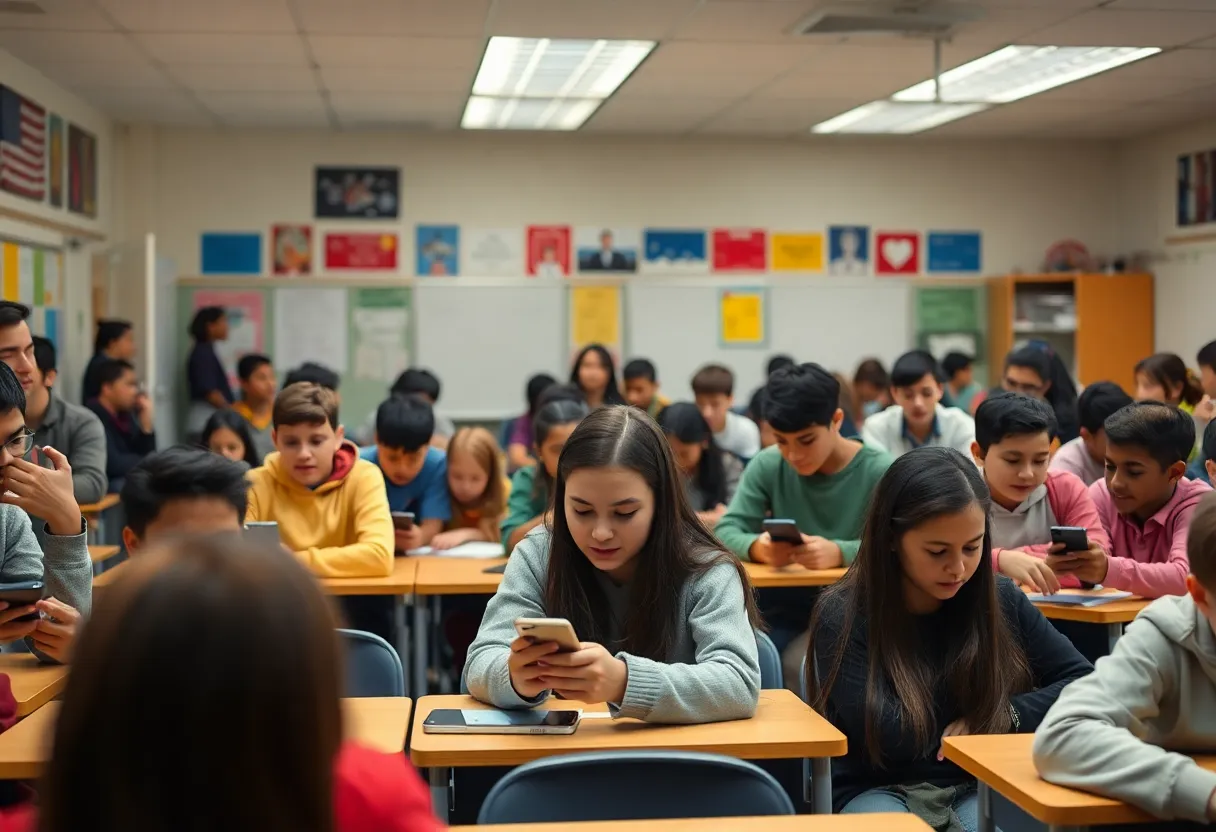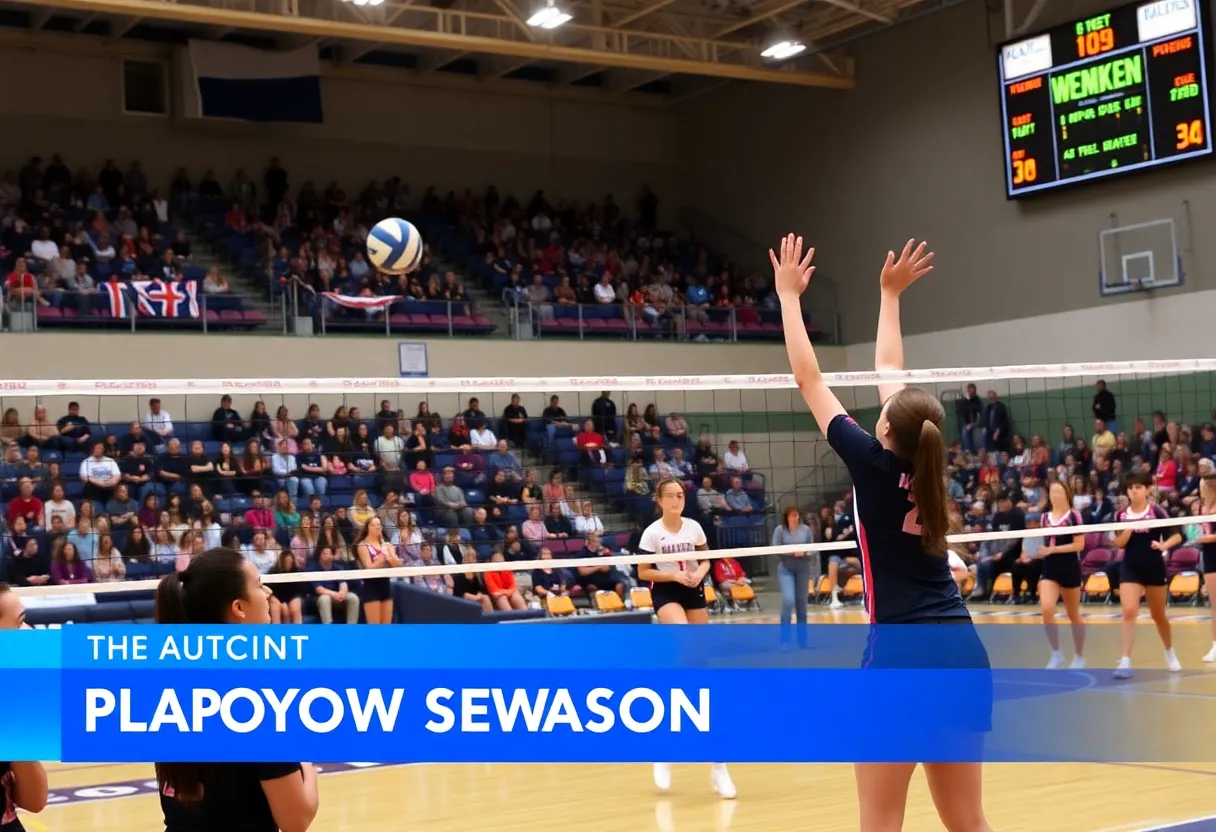News Summary
Nevada schools have reported a significant rise in student productivity and engagement following a new policy that restricts cellphone use in classrooms. Implemented statewide through Senate Bill 444, the legislation aims to standardize cellphone policies and minimize distractions during educational activities. Teachers, parents, and lawmakers have expressed support for the initiative, highlighting improvements in focus, social interactions, and overall classroom environments. However, concerns about the effectiveness of policy enforcement and emergency communication persist among some stakeholders.
Las Vegas, Nevada — Nevada schools are experiencing a notable increase in student productivity and engagement attributed to a new policy restricting cellphone use in the classroom. Since the implementation of this policy at the start of the 2025-2026 school year, educators like Rancho High School teacher Reuben D’Silva have reported a rise in the rates of work submission, largely due to the absence of cell phones during instructional time.
During discussions surrounding this legislative change, D’Silva, who previously worked as a state assemblymember, expressed strong support for Senate Bill 444 (SB444). This law compels school districts across Nevada to create policies governing cellphone usage in educational environments, aiming for a standardized approach statewide. The legislation received unanimous approval from the Nevada Legislature, highlighting a bipartisan commitment to address the challenges posed by mobile devices in academic settings.
As part of a broader movement, Nevada joins 17 other states and Washington, D.C., in restricting cellphone use in classrooms, expanding the total to 35 states that now have laws or guidelines aimed at minimizing phone distractions during school hours. Florida was the first to implement such a law in 2023, signaling a growing acknowledgment of the detrimental effects cellphones can have on students’ focus and mental well-being, as highlighted by Senator Angie Taylor, the bill’s sponsor.
While advocates of the cellphone restrictions celebrate improved classroom environments, critiques of the policy have surfaced. Some parents, including Rebecca Dirks Garcia, argue that the focus should extend beyond cellphone use to tackle the underlying issues contributing to student disengagement. This sentiment reflects a perspective that a multifaceted approach may be necessary for fostering genuine student engagement.
Teachers across the state are finding innovative strategies to manage cellphone usage. For instance, Elizabeth Adler has introduced the use of fidget toys for students who comply with cellphone surrender at the classroom door. Similarly, some schools, such as Reno High, have established systems where students exchange their phones for calculators during math classes, allowing for tailored enforcement of the policies.
School administrations play a critical role in the consistent enforcement of cellphone policies, often aided by hall monitors, which significantly enhances their effectiveness. However, variations exist among individual schools, leading to mixed experiences surrounding the adherence to cellphone restrictions. Some parents have raised concerns about their inability to reach their children during school hours, emphasizing a need for reliable emergency communication while still supporting the broader aim of reducing disruptions in classrooms.
Research conducted by Julie Gazmararian from Emory University corroborates the positive outcomes reported by educators. Many teachers have noted a decline in classroom disruptions and an improvement in student focus since the restrictions were put in place. These benefits also extend to social interactions among students, who are engaging more with peers and showcasing increased levels of social connection without the distraction of their mobile devices.
Student feedback has been largely favorable, with some like Nala Williams from Cimarron-Memorial High School reporting a stronger sense of social engagement and a reduced inclination towards academic dishonesty since the banning of cellphones. This sentiment echoes the findings from recent surveys indicating that a substantial 65% of parents support banning cellphones during class for their children.
Furthermore, certain districts, including Carson City schools, have implemented measures such as Yondr pouches to secure student phones during class hours, thus further facilitating a distraction-free educational environment. School administrators have observed heightened excitement and participation levels among students, suggesting the absence of cellphones is significantly benefitting the educational atmosphere.
Despite the overall positive reception and increased support from both parents and educators for cellphone restrictions, concerns regarding the uniformity and effectiveness of policy enforcement persist across districts. As Nevada schools continue to navigate this new legislation, the focus remains on maintaining productive learning environments while addressing the diverse concerns of students, parents, and educators alike.
Deeper Dive: News & Info About This Topic
HERE Resources
Nevada Schools Enforce Statewide Cell Phone Ban
Additional Resources
- The Nevada Independent: How are students and teachers dealing with Nevada’s new restrictions on phones in classes?
- Google Search: Nevada cellphone restrictions in classrooms
- News 3 LV: Nevada governor signs bill banning cell phones in classrooms
- Wikipedia: Cell phone policy in schools
- The Center Square: Nevada’s cellphone ban in classrooms
- Google Scholar: Cellphone use in classrooms
- The Nevada Independent: Washoe schools gearing up to further restrict student cellphone use
- Encyclopedia Britannica: Student distraction cellphones
- Nevada Appeal: Carson City school district cellphone policy is working
- Google News: Nevada school cellphone policy
Author: STAFF HERE LAS VEGAS WRITER
The LAS VEGAS STAFF WRITER represents the experienced team at HERELasVegas.com, your go-to source for actionable local news and information in Las Vegas, Clark County, and beyond. Specializing in "news you can use," we cover essential topics like product reviews for personal and business needs, local business directories, politics, real estate trends, neighborhood insights, and state news affecting the area—with deep expertise drawn from years of dedicated reporting and strong community input, including local press releases and business updates. We deliver top reporting on high-value events such as Electric Daisy Carnival, World Series of Poker, and Consumer Electronics Show. Our coverage extends to key organizations like the Las Vegas Chamber of Commerce and Three Square Food Bank, plus leading businesses in hospitality and entertainment that power the local economy such as MGM Resorts International, Caesars Entertainment, and Las Vegas Sands. As part of the broader HERE network, we provide comprehensive, credible insights into Nevada's dynamic landscape.



